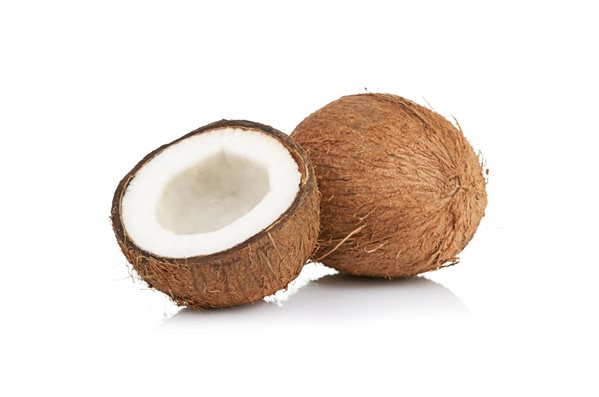My baskets
You still don't have anything in your shopping cart
My baskets
You still don't have anything in your shopping cart

{{getOldPrice()}}{{getPrice()}}
 ¡ Buying this product you get {{calculatedProductMenttos()}} menttos !
¡ Buying this product you get {{calculatedProductMenttos()}} menttos !


Coconut is the fruit of the coconut tree, a tropical palm. It has a fibrous outer shell and a hard inner layer of brown color that protects its white and aromatic pulp. Its interior contains coconut water, a refreshing and slightly sweet liquid. The pulp has a firm texture and an unmistakable tropical flavor, highly appreciated in both sweet and savory recipes.
Properties and benefits:
Coconut is an excellent source of healthy fats (mainly medium-chain triglycerides), which the body uses as quick energy. It provides fiber, potassium, magnesium, and iron, as well as vitamins from the B group and vitamin C. Coconut water is rich in electrolytes, ideal for hydrating after exercise. Moderate consumption helps improve digestion, strengthen the immune system, and maintain healthy skin and hair.
Nutritional value per 100 g (fresh pulp):
Water: 45 g
Energy: 354 kcal
Proteins: 3.3 g
Carbohydrates: 15.2 g
Fats: 33.5 g
Storage and tips:
A whole coconut can be stored at room temperature for weeks. Once opened, the pulp should be stored in an airtight container in the refrigerator and consumed within a few days. It can also be grated and frozen to preserve it longer. Coconut water should be consumed immediately after opening the fruit to take full advantage of its freshness.
Recipe and culinary uses:
Fresh coconut can be eaten as is or used grated in desserts, smoothies, and curries. An easy and refreshing recipe: tropical coconut and pineapple smoothie. Blend the pulp of half a fresh coconut, 200 ml of coconut milk, 2 large slices of pineapple, and ice to taste in a blender. Blend until creamy and serve well chilled.
Coconut is the fruit of the coconut tree, a tropical palm. It has a fibrous outer shell and a hard inner layer of brown color that protects its white and aromatic pulp. Its interior contains coconut water, a refreshing and slightly sweet liquid. The pulp has a firm texture and an unmistakable tropical flavor, highly appreciated in both sweet and savory recipes.
Properties and benefits:
Coconut is an excellent source of healthy fats (mainly medium-chain triglycerides), which the body uses as quick energy. It provides fiber, potassium, magnesium, and iron, as well as vitamins from the B group and vitamin C. Coconut water is rich in electrolytes, ideal for hydrating after exercise. Moderate consumption helps improve digestion, strengthen the immune system, and maintain healthy skin and hair.
Nutritional value per 100 g (fresh pulp):
Water: 45 g
Energy: 354 kcal
Proteins: 3.3 g
Carbohydrates: 15.2 g
Fats: 33.5 g
Storage and tips:
A whole coconut can be stored at room temperature for weeks. Once opened, the pulp should be stored in an airtight container in the refrigerator and consumed within a few days. It can also be grated and frozen to preserve it longer. Coconut water should be consumed immediately after opening the fruit to take full advantage of its freshness.
Recipe and culinary uses:
Fresh coconut can be eaten as is or used grated in desserts, smoothies, and curries. An easy and refreshing recipe: tropical coconut and pineapple smoothie. Blend the pulp of half a fresh coconut, 200 ml of coconut milk, 2 large slices of pineapple, and ice to taste in a blender. Blend until creamy and serve well chilled.
